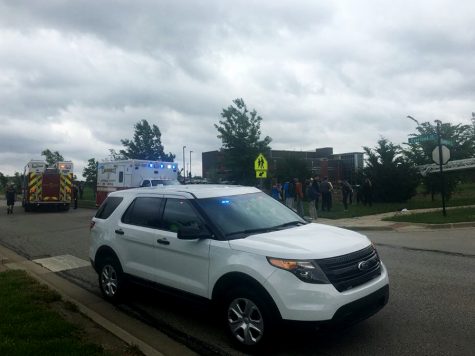Students, staff advocate for inclusive bathrooms
Genderfluid freshman Nathan Russell is often forced to avoid the women’s restroom until it empties. Russell faces ridicule in the women’s restroom and feels unable to use the men’s.
The building has six single-occupancy restrooms: one in the nurse’s office, one near the gym and four locked in the hallways. Principal Myron Graber says that these are locked for and tend to be used by special education students.
Gender neutral bathrooms provide facilities for students who do not feel comfortable in either the men’s or women’s restrooms due to their gender identity, but none of the six restrooms in the school that could fulfill this need are as convenient as the classically designated restrooms.
The debate over gender identification rights is raging in public conscience across the country and making its way into legislation. The argument for gender neutral bathrooms reverses the stance of the civil rights fought for by Brown v. Board of Education, that separate but equal is not equal. In this situation, gender neutral students are asking for the exact opposite. They seek separate facilities tailored to them, but with equal convenience and capability.
The restroom located in the nurse’s office sees use many time a week according to nurse Paula Hatcher. A wide array of students use it, including special needs students and those who are anxious about public restrooms, as well as gender neutral and transgender students.
“I don’t question anyone who comes in to use [the restroom],” Hatcher said. “Anyone can.”
The bathroom is the nurse’s office has been around for all 19 years of Fee State’s existence and has operated under the same principles since its inception, Hatcher said. A simple policy of universal acceptance and no questions has governed this restroom, and Hatcher says it has had no problems thus far.
Overall, Hatcher is satisfied by the school’s acceptance of any stu- dent who wants to use the alternative bathrooms, be it due to anxiety, gender identity or otherwise.
“[Students] need to have their privacy respected and feel com- fortable in their surroundings,” said Hatcher. “Kids who feel anxious or nervous, some kids just feel that way anyway, about using the re- strooms at school… that can cause a lot of [repercussions]. Any time you can provide privacy for people who have any issues or shyness with using public restrooms or gender issues, that’s a good thing.”
The issue is a personal one for Russell.
“On days that I do dress up like a boy and go to the bathroom in the women’s bathroom, a lot of people give me dirty looks or tell me to get out and that it’s really embarrassing because they feel like a guy is in there with them,” Russell said. “Sometimes I want to go in the guy’s bathroom, but I really can’t. I’d feel a lot more comfortable in the same bathroom as the gender I want to be. I usually just wait until everyone is done going to the bathroom, and then I go when no one is in there.”
Graber acknowledges there is room for improvement but defends the school’s efforts as well.
“I would say we are meeting the basic needs,” Graber said. “I am sure we could always improve accessibility, location and signage. We have made a genuine effort to respond to the needs of our students given the limitations of an existing facility.”
For Russell, the private bathrooms are a good idea, but lack in publicity. Russell didn’t know of them before.
“They should have a sign that says something like ‘gender neutral’ on the private bathrooms, or on the announcements they should say ‘we have private bathrooms if you don’t feel comfortable going into the other bathrooms,’” Russell said. “They should be unlocked for sure.”
Private, neutral, bathrooms for anyone who feels inclined to use them are more inclusive and equal for everyone, and the school should bear the responsibility of involving everyone, Russell argued, but Graber says he knows only the directives for handicapped individuals set forth by he Individuals with Disabilities Education Act.
Governments should mandate public schools to include such facilities, and the opposition to such legislation stems from parents who are afraid they will influence students’ gender identity according to Russell.
“If we could have actual, gender neutral bathrooms then yeah, it would be a lot more comfortable for me and a lot of other people,” Russell said. “If it wasn’t hidden, like we have bathrooms for girls and guys over here and then neutral somewhere else, I think they should just have all three together.”
Graber notes there is no objectively correct and viable solution, but the administration, headed by Graber, will ensure that students will receive fair and measured treatment.
“In life we are all put in uncomfortable situations,” Graber said. “In my position, it is imperative that all students that attend Free State will and should be treated with dignity without fear of repercussion.”









